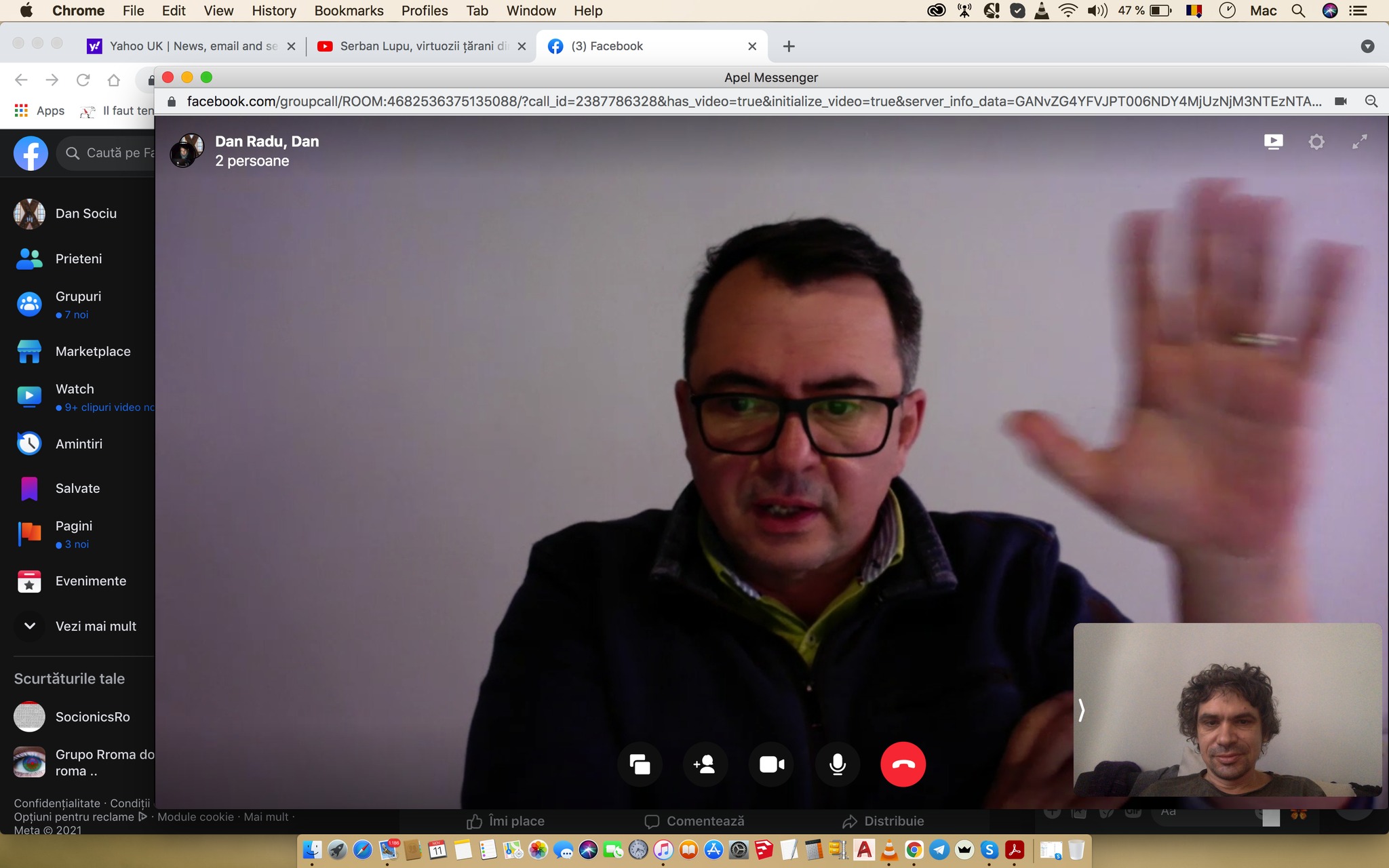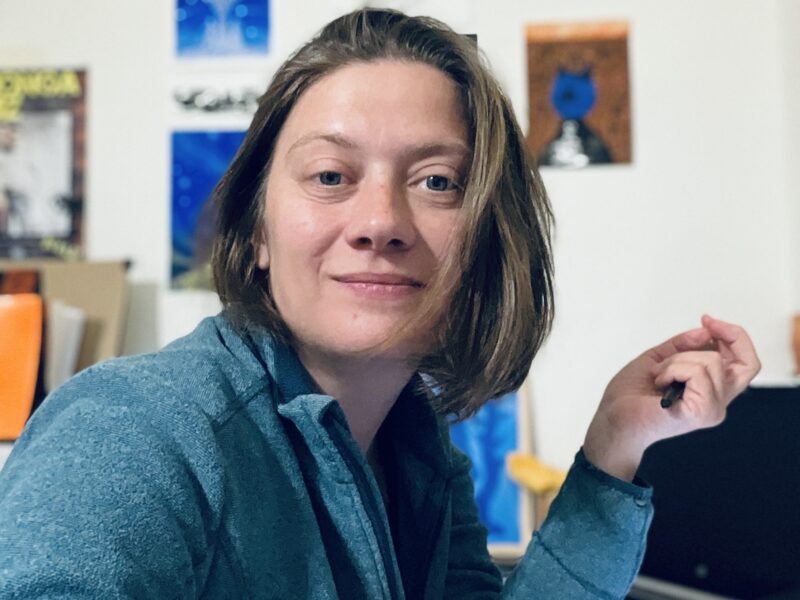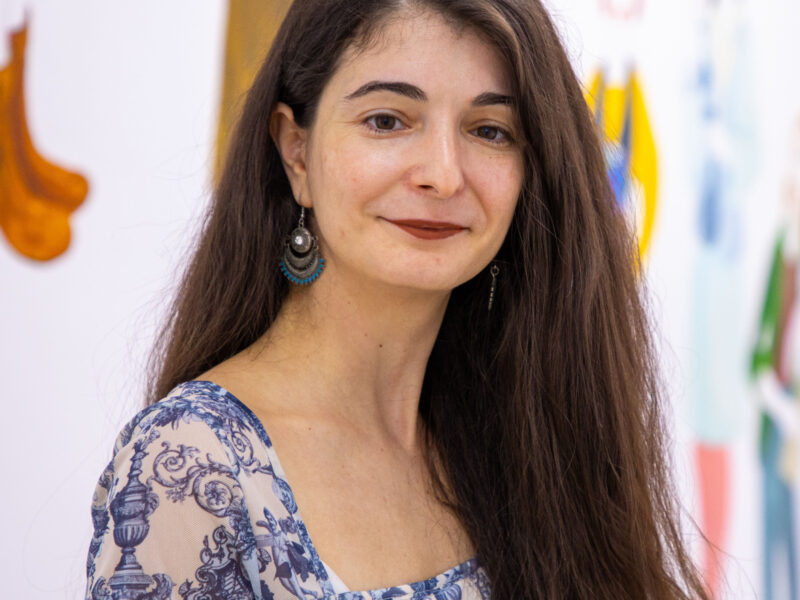Dan Sociu is a writer, translator and journalist. He published poetry, fiction, participated in international festivals and creative residences and received numerous awards. Among his volumes of poetry we can count jars well tight, money for one more week (2002, 2021), eXcessive songs (2005), Pavor Nocturnus (2011), Come with me; I know where we’re heading. Anthology 1999-2014 (2015), Swine and sentimental, wise and mean (2021), but also Mouths dried with hatred, published in English by Longleaf Press, University of Virginia, in 2012. Urbancholia (2008, translated into Serbian), Special needs (2008, 2019), Pluto in Scorpio (2020) are among his volumes of fiction. Recently, he published the novel Monarch (OMG, 2021).
Dan Radu Mihai is a film director and a screenwriter. He directed the short–films The Heist (2011), Sthorzina (2014), Wall (2015). He debuted as a writer with Monarch.
At the end of a Goodreads review, a reader wrote about Monarchthe following: “I’m eager to know how did the two authors co-write such a small text, how did they managed their fragments and characters.” How did you write this novel?
Dan Sociu: Everything connected strangely well, I would come up with one idea, he would come up with another, we would send them to each other on the phone through messages or on Facebook and we would discuss them for a bit, not necessarily for hours, just about half an hour, if they go as a whole or in detail, how we feel, and so on. And suggestions came up our way or sometimes something he thought matched something in my life and vice-versa, very strange to be fair. In the beginning, the story of the film we wanted to make was a surreal one, total madness, so pretty much anything would work, the only rule was that it had to be something original. Then, after we applied to CNC with the script and received extreme, maximum and minimum grades (I was in England and maybe I got influenced by the more pragmatic atmosphere here), I told Dan Radu to turn it into a story almost realistic, only with a Science Fiction pretext, but otherwise it should be a story about assuming or not assuming reality, especially when reality is unusual, something that was talked about a lot during the pandemic, so many chose to deny what they were seeing and hearing. It's also a story about friendship, about going back to one's origins and somewhat religious. I think that Dan Radu actually wrote more, that is, more text, but I cut twice as much. This is my pleasure, a murderous pleasure, to cut. The book is also thought of as a film, so he put in things that go in that sense, and I put in literary parts, the interiority of the characters or details, because from my experience as an editor and translator I have a talent for essential details
Dan Radu Mihai: When I was a kid and went with the boys from the block to play football on a field that was further from our home, we used to pass while walking, that is, we passed the ball from one to another and you were only allowed to touch it twice; stop and go. It was more difficult than on the field, because you had to avoid cars, people, and the one who made the most mistakes was the goalkeeper when we arrived. It was like that with this story, we passed it from one to the other, and it was beautiful, with short and intense parts and long pauses. The messages on Facebook or on the mobile show what the dynamics of the relationship were. Dan writes short and to the point, if you copy his messages and paste them on a white page, they stand out like the lines in a poem; I even told him that I will extract some poems from these messages. Mine are full of mistakes, I often write on my mobile, I don't wear my glasses and I often mistype, but he gets what I want to say. Returning to football, I wrote it in two legs, in the first one I played freely and inspired, I lost, because I didn't win funding at CNC, in the second one I timed the game, I played according to the tactics and it seems that it was the right choice because, look, it's published.
And how did you write it together? Was it your first collaboration?
DS: When my short novel Combinationcame out, he wanted to do a screenplay and he wrote to me and we met at a pub a few times, we talked about movies in general, but nothing came of it, except that we get along quite well. And, years later, I put a script idea on Facebook and he wrote to me again.
DRM: About 8 or 9 years ago I read Dan’s Combination and said it would work for a movie script. The I had in mind to do something online, some kind of web-series, no one paid attention to me, but I wrote him an email. I remember that I didn't have his email, I wrote like this, in a slap, to the office address at totb.ro, where Dan was writing at the time, and I said give me this man's address because I want to make a film with him. We met, we talked several times, but nothing connected. I was hoping to be able to make the film independently, it was an illusion, but we remained in discussions, even if we didn't write to each other for a few years, then the correspondence came naturally.
How did you end up publishing at OMG and how was the collaboration with Alex Văsieș (the editor)?
DS: I owed Alex Ciorogar a book, which he had already announced, but I published it at Polirom, Swine and sentimental, wise and mean. So I told him I had another one. I had nothing to do with Văsieș, he corrected what needed to be corrected there and I gave him my corrections and that was it.
DRM: For me it was quite simple, something like this: wherever you say we should publish, that's fine for me. In the end, I'm glad it's at OMG, it brings out avant-garde and young writers with strong voices, and I feel like hag among them. Good thing that Sociu is not a young man either.
Dan Radu Mihai said that he wrote the script for the short film Sthorzina during a flight from Bucharest to London. Dan Sociu said that he wrote the novel Combination in a week and a few days. Were these isolated cases when you wrote the texts (almost) from one sitting or is this the rule?
DS: Yes, that's how I wrote almost all my texts, that's how it is when you have other things to do, pressures of all kinds, you get used to writing quickly. There is also a province-capital difference, in the capital everything is delivered faster; even stories over beer are told in a more essential way. Something is lost, perhaps the charm of stretching the conversation and certain perfectionism, tinkering, but energy is gained for the text and a better adaptation to the patience of the contemporary reader and viewer. A critic from the province said of the first part of my book Pluto in Scorpio that it is more literary than the second part and that's right, he saw well, if you define literary in that sense, of the set story. Let me tell you, it was August, I had eaten a vegetable soup that I didn't like, I think it was made from cabbage, it seemed to me that it wasn't very bright in color, I told my wife, Ancuța, don't you think that this cabbage is a bit yellowish (I'm mean now, actually the style of the province, where I come from, it's nicer, it's like Sadoveanu, there are others, but what am I supposed to do if most of the book buyers are in Bucharest, Iași or Cluj)? Of course, he was talking about style, the fact that in the second part the style is elliptical, with jumps; I no longer build the progression, but exactly, because I had adapted the style to the place of the story, the first stories really happened in the province and the last ones in Bucharest. It's that principle of incompleteness, if you have two dimensions, you don't have the third, if you have speed, you don't have elaboration, it can't be both, one and the other, and you have to take the product as such, not ask for it to have everything.
DRM: I haven't written literature before, basically, this is my debut, but yes, the scripts I wrote were written like that, in one sitting. It is true that they came after a very long period of grinding ideas, drafts, and structures. In film, the biorhythm is different, for me the big consumption is in pre-production and in production, in casting especially, that's where I say the stakes of the film are played, the script is an intermediate phase, with a double role: to be able to bring money for the production of the movie and to reproduce how the movie will look. Often these roles pull the story in opposite directions and it's hard to keep it under control. Yes, I wrote the script from Sthorzina on the plane, maybe that's why it also happens on the border, because we were between worlds, I remember that on landing there was a failed attempt, the pilot changed his mind and took off the plane again in the air, there was some panic on the plane, and I was right at the end, I closed the laptop, I said let it go, maybe I don't need to think anymore, but the second attempt was lucky. I was going to a course held by Guillermo Arriaga and the opportunity arose to discuss the script, he said it was a story with a South American feel and I didn't think likewise, but it felt good to hear that from him.
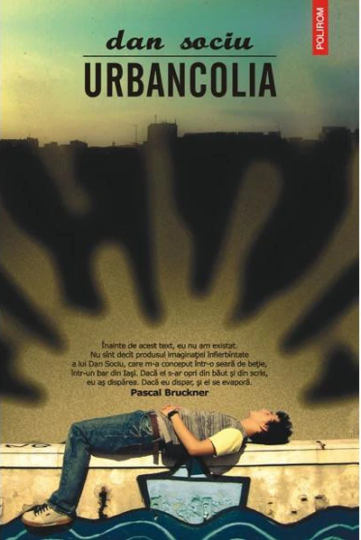

Urbancholia will last, as Dan Sociu said in an interview, as long as there are poor kids in the provincial cities. Irina, Alex and Marcel from Wall seem to be this type of kids. Are you the type of writer who goes everywhere with a notebook or how do you build your characters, stories, moods?
DS: I don't write anything down, I tried it once, for a few days, and I only used what I remembered from the notes anyway. If I can't remember something, it's not memorable, right? If you're a director, you probably have to write down all the shenanigans so you don't miss a beat, but as a writer I go by my emotional memory. I've also gotten used to telling the same stories from my life, to the dismay of those who know me better and keep hearing them, but this is also like training, that's how mastery is done, until I got to control them perfectly and even recently I got to write my life again, this time in a sober form, although driven by associativity, not absolutely linear, how you would lie, say, lying on your back in the hospital and tell the person on the bed next door, a simple man, not even a book reader and you would have a few days at your disposal, let's say two weeks, you have a serious illness, one that puts life in a completely different perspective and you suddenly see what is important and what is not .
DRM: I've tried keeping a notebook, but I don't have the discipline to do that. I have this belief that a film should not be about what happens to the protagonist, but about what he sees happening around him at a given moment. Given how few films I've made, I'm probably pretty far from how other people see film, and when I say others, I mean the producers. This way of seeing the film also changes the way you construct it. Yes, I carry the characters and narrative threads with me for a long time, the worlds I cross in my daily life mix with the world I try to (re)constitute in the script. I had periods when I was watching movies, I would stop them after 30-40 minutes, I felt that I couldn't watch them anymore, I would continue with others and the story would link from one to another, without any connection between them, another than me, the one watching them. These periods overlap with those when I'm working on a film or a script. The names of the characters mentioned in the question, even though they are so common, come from the writings of Anton Holban: I saw them as in-world and otherworldly extensions of those characters. It's interesting that you associate them with poor kids from provincial towns; it shows how far they've come.
How much work do you do on the first draft of your texts before they reach the final form for publication/filming?
DS: I write the poems, especially the rhyming ones, from one end to the other and only sometimes I change something, but with the novels I still feel like cutting it, I mean making it a poem? Like: “that's nice, but it's not important, neither this”. And important means what impressed me the most, not just what society considers important.
DRM: I was talking about the double role of the screenplay above: that of getting the film out of your head and the money out of the financiers' pockets. There is a danger that every time you think you have fulfilled one role, you feel that the other one is not illustrated well enough, and then you can enter a spiral of (re)writing. This also gives you some freedom, because the script is an intermediate stage, but it does not mean that you throw it away, as soon as you have seen yourself on set, during filming. There are directors who hang on to the sound of every line and don't let the actor improvise or get carried away in the moment, and others who throw away the script on the first day of shooting. I am neither the first nor the second of these types.
How did you find your first publishers or first producers? How did you convince them?
DS: The first publisher was at Junimea in Iași. Ovidiu Nimigean insisted on the editor-in-chief there, but he didn't really want to work together, then I once went to a reading at the Penitentiary and when I was visiting the cells, I didn't go into one of the women's cells, I stayed in the hallway with Mihai Ursachi, who told me that he doesn't go inside because he's afraid the door will close behind him for good and I told him that I didn't want to go in either because I know women are ashamed of us and I think he liked me because of that and then he recommended me to Cezar Ivănescu, the manager of the publishing house; so out of delicacy, I earned my living. There was also a competition, Ronald Gasparic, and Ivănescu recommended me to be the winner.
DRM: Just like I did with Dan. I wrote emails to the production houses introducing myself and the synopsis of the story. I think the third answered me. After the first experience, together with the cinematographer I worked with at the time (Pătru Păunescu), we set up a company with which we tried to produce films signed by me, as well as by other filmmakers.
Now that you already have a portfolio, is it easier to find publishers and producers? More specifically: Dan Sociu published at three different publishing houses in 2021 alone; how did this happen? Dan Radu Mihai also collaborated with other production companies alongside Dash Film; how did they join the projects?
DS: Yes, it's easier in literature, the investment is smaller. Film wise, Dan could tell. It’s a lot of money involved.
DRM: I don't have a portfolio, that's a lot to say. For a director, feature films matter, and I haven't managed to make one yet, which puts me in a pretty unwieldy position for a producer. A debut is a gamble and producers weigh these relationships quite carefully. However, I am no longer at the age of debut, probably there have been rigidities in the way I present myself, differences in perception, that's why collaborations with other producers are almost non-existent. I say almost, because there are attempts, but they remain at the stage of glacial politeness and courtesy groupings. And I don't want to blame the producers. It's definitely about me, I'm probably sending ambivalent messages on the one hand, yes, let's work together, but there's probably another attitude, a bit more refractory, that doesn't facilitate the development of the relationship. The relationship between the producer and the director is, at least in the first phase, one dominated by power and its management requires substantial resources of energy.
How involved are you in the production of your books or films? From the fonts to the cover and paper type on the one hand, from casting to lights and sound on the other.
DS: As much as the publishing house allows me. An advantage of smaller publishing houses is that you can experiment editorially, I have very thin volumes that Polirom, for example, does not publish for reasons of industrial standards, but I want them to appear like this, more intense, like pieces of art. There is some snobbishness about it here, sometimes the books published by smaller publishing houses were not even commented on, although look, a poet like Frank O'Hara published just like that and had a huge influence, he even reached a boy from Botoșani, who I think read it for the first time in the Interval magazine from Brașov and was immediately convinced by the idea that poetry can also be like a communication on the phone or on the terrace, with the superficiality, but also the charm of one.
DRM: As I said above, I was and am largely involved in the production of my films. Of the four short films, only one had CNC funding, so I'm very used to the independent production environment.
Are you also actively involved in promoting your films and books?
DS: The promotion game caught me in the 2000s as an ironic game, it was something new and somehow democratic, it contradicted the elitist expectations, the pretended modesty of the elite, which scorns such a thing, but has a whole promotion apparatus in back, as does the financial and administrative support. At Polirom and Cartea Românească I was a colleague with the promotion people and when I do something for a book of mine, I know that I am also doing it for them, that I am in a team with them. It's nothing shameful, it's just an action, and besides, all animals have methods of advertising and consume energy for them. It's a shame when the promotion is boring or mechanical, but otherwise, the very art of the last century is one of the creative personality that imposes itself and what it creates is part of the tools of imposition. The artist is a character, not necessarily in the strictly narcissistic, mediocre sense, he may be a great virtuoso, but the problem is that there are hundreds of thousands of virtuosos now, since education has been democratized. Glenn Gould was a very good pianist, but if he hadn't done comedic roles on TV and interviews with smart music analysis, he wouldn't have had the same exposure as so many other virtuosos. And what would be the point anyway, why be that way, why not mind your own business? Well, you're like a mother who pushes her children into the world, you want their best, you struggle, of course. This is a delicate game, it can't be done in any way, it's about the contexts, the other players, it's complicated, it's like chess with variable parts, although to be honest, I was blessed with horse glasses, you know the glasses that are put on horses so they can't see around, not see other horses especially, and run without fear. I can see the other horses, sure, sort of, but not too much.
DRM: I'm pretty opaque when it comes to (self) promotion. Even though I have quite a long experience in the advertising world, I don't feel good in the position of promoting my films. It's a mixture of fear, impostor syndrome, and probably pride that makes me lose my freedom when it comes to getting involved in such endeavors, and if I insist, the results are naive. Here I have to learn a lot from people like Dan, who have a disarming naturalness when talking about their creations.
How important are industry awards or nominations? Do they have any concrete influence on those books or films or on your career in general?
DS: For me, first of all, they have a financial value, literally, because almost all my life I was pressured by rents and other things and when a prize came, I calculated immediately: “2 months of rent, good” (although it is something rare, maybe a month of rent value and the maintenance). But they also have value because the mother sees it, says “bravo”, some others see it, they contribute to the brand, when they don't spoil it for you, that is, you become a prize subscriber, but I didn't do much diplomacy for them, it's impossible to say, on the contrary. So, they are like quick expeditions of conquest and plunder, after which I return to my wildness.
DRM: I've only won one award, and that was at a fairly minor festival, and festival selections don't count, so I don't know how important they are. It surely gives you visibility, but it's not sure if that's a good thing.
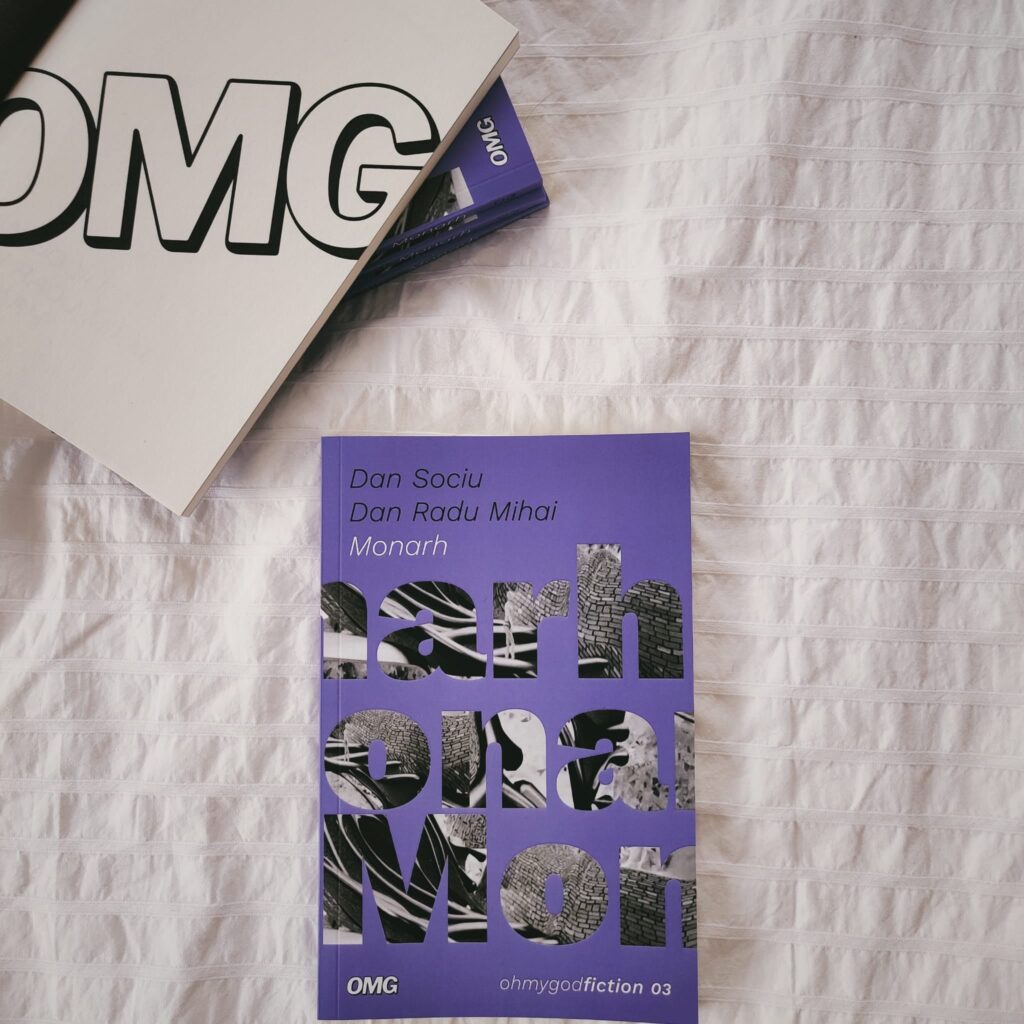
Are you interested in public feedback? Do you follow what is being written or said about your movies and books? Do you interact with these people, like the Goodreads reader mentioned above, or how people comment on YouTube on The Heist?
DS: You should know that the Goodreads reader trashed my penultimate book, but liked the one before it. Not that I became obsessed with her but we happened to be at the same table last year and then I found out it was her. I was annoyed that she criticized the presence of some fragments also put on Facebook in the next to alst book, and it seemed unfair to me, I mean, why wouldn't I have put them there too? But it's good that she liked this book, I always feel a little guilty that readers spend so much money on a book, even though it's not a lot of money, but my mind is stuck on prices and salaries from before and I myself can’t afford it. On the other hand, a glass of wine at a pub is almost as expensive as a book. I hope that at least some of the libraries reach them and the poorest people could read them.
DRM: Yes, I'm interested; it's a very good barometer. I have a few reactions that I keep close like collector's stamps. In Clermont-Ferrand, it was the last day of the festival, I was going to the place where the screenings were taking place and I was stopped by a couple, they were about seventy years old, to tell me about how the film (Sthorzina) reminded them of some sort of friends they have and how much they liked it, and I looked at them like aliens, because something like this had never happened to me before: to have some people stop you in the street and tell you what a great thing you had done. And something similar happened in South Korea, in Busan, where a professor from the film faculty brought her students to show them my film (Wall) and told me that my film is braver than Puiu's (Cigarettes and Coffee). I laughed, but she said she was serious, so I'm saying it here too, to remain written.
What are you working on now?
DS: We were planning another sci-fi story in the same style, with a lot of new wave realism on a fantastical premise: it starts in the 90s and we want to recreate something of the atmosphere from that time, which was really special.
DRM: A story from the '90s, with kids who have not yet put on their adult clothes, to quote from the classics.
If Monarch ends up at Marvel who should illustrate it and then who should do the soundtrack when it's screened?
DS: If it ends up at Marvel, as we joke to encourage ourselves, it won't be ours anymore, they'll do the production. It’s their job. But maybe I would push some people with whom I worked before, my longtime partner on graphics and Cosmin Postolache on music. I tell them this at Marvel, my terms, personally, I want 10% royalties, one million in advance and let my friends handle the artistic part. And they will say: “OK with the percentage and the million but we want our team on the artistic side”. And I will agree immediately, of course.
DRM: I also want to pull some strings, so I propose my daughter (she's good at it and studies at Tonitza high school) along with Dan's longtime partner and Maria Balabaș on music, because she's the only composer I know and she let me make a video for her so I'm returning the favor.
Why Marvel and not something a little more indie?
DS: Well, because we are indie. We could do it ourselves, like this, with some friends; maybe in the end we'll do it like that, if there's no other way.
DRM: Same as Dan.
[The photos are part of the archive of Dan Sociu and Dan Radu Mihai.] [Translated into English by Edward Vasile.]

